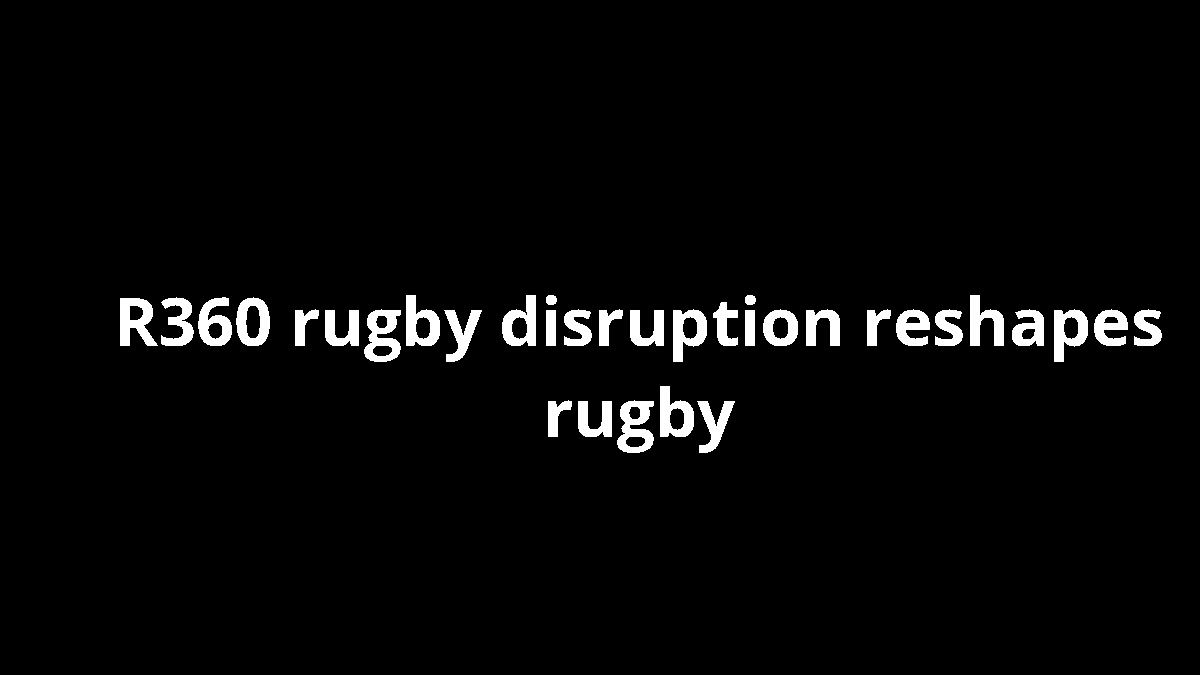R360 rugby disruption reshapes rugby
R360 rugby disruption has entered the discourse with speed, raising questions about governance, pace, and welfare. This term, debated by fans and analysts, is shaping how clubs plan, sponsors allocate resources, and players negotiate contracts. In this moment, veteran observer Matt Williams argues the sport risks drift unless reforms are decisive. The debate isn’t merely branding; it’s about recalibrating rugby’s tempo and safeguarding those who bear its toll. As leagues reassess calendars, broadcast slots, and revenue sharing, the prospect that a disruptive force could steer reform without eroding competition seems plausible. For fans, executives, and players, the coming months will test whether R360 rugby disruption becomes a catalyst for sustainable change or a source of volatility.
Context and Critique
Background and Williams’s assessment
Veteran rugby watcher Matt Williams frames this moment as a critical inflection point, where welfare standards, commercial incentives, and on-field tempo collide. He argues the sport risks drifting toward a model in which speed of play and revenue pressures outrun protections for players. Williams isn’t alone; broadcasters, players’ unions, and several governing bodies have voiced concerns that the current trajectory could erode the sport’s social license if left unchecked. The debate shapes contracts, scheduling, and the weighting of sponsorship deals. Some view R360 rugby disruption as a catalyst for meaningful reform, while others fear abrupt changes could destabilize competitive balance. The resilience of rugby will hinge on reforms that balance pace with welfare and governance. Coverage of the debate appears across outlets such as BBC Sport Rugby and policy discussions highlighted by World Rugby, underscoring how widely this issue is weighed by clubs, leagues, and players.
Real-world tempo and stoppages
Across domestic and international stages, the tempo of rugby has accelerated, yet stoppages, timeouts, and commercial breaks have grown too. Protracted referee decisions and broadcast windows lengthen match days, increasing cognitive load on players and squeezing rest between games. Critics argue this pacing strains welfare protocols, raises injury risk, and challenges conditioning regimes. Proponents counter that tighter schedules boost broadcast value and sponsor engagement, and that reforms can accompany stronger welfare measures. The debate around R360 rugby disruption highlights a broader tension: how to sustain high entertainment value while safeguarding player health and livelihoods. Observers point to shifting governance models discussed by World Rugby and echoed in coverage on BBC Sport Rugby, illustrating how tempo and welfare increasingly depend on governance and data sharing.
R360: Disruptor or Liberator
Disruptive mechanics and potential liberator arguments
Supporters of R360 rugby disruption describe it as a lever to rebalance power and resources in the sport. By reframing sponsorship, revenue sharing, and governance, this concept could accelerate structural reforms that align the game’s pace with welfare safeguards. It could push for clearer player protections in contracts, more transparent governance, and incentives for sustainable competition rather than short-term wins. Critics, however, warn that disruption without guardrails risks destabilizing leagues, widening gaps between rich and poor clubs, and eroding fan trust if disruptions feel gratuitous. The balance lies in channeling disruption toward deliberate reform rather than chaos. For those tracking the idea, R360 rugby disruption is more than branding; it is a hypothesis about how money, leadership, and strategy intersect on the rugby field and in the boardroom. Observers will watch how sponsors and unions respond in the coming months, including conversations noted by BBC Sport Rugby and governance discussions on World Rugby.
Economic and governance trade-offs
Even if disruption translates into faster reforms, the trade-offs are substantial. Greater financial leverage could secure protections for players but might also inflate expectations and introduce volatility into sponsorship markets. Governance reforms would need careful design to preserve competitive equity, maintain broadcaster confidence, and protect fan trust. Critics worry about misalignment between promises and delivery, and the risk that a dominant force could push through changes that advantage a few. Proponents acknowledge risk, yet argue governance reform is overdue, particularly around revenue sharing, welfare funding, and independent oversight. The practical test is whether R360 rugby disruption yields structured, durable reform rather than episodic upheaval that short-circuits consultation. The debate reverberates across industry analysis and major rugby publications, with stakeholders watching closely how reforms unfold.
Player Welfare and Game Pace
Tempo, welfare, and resilience
At the heart of the debate is welfare: the physical, mental, and financial resilience of players who endure longer seasons and faster games. Proponents argue reforms must integrate robust rest periods, medical protocols, and fair compensation with the pace of modern rugby. The R360 rugby disruption conversation emphasizes systemic attention to conditioning, recovery, and load management, drawing on data from elite teams and independent researchers. Critics worry about operational complexities—tightened schedules could strain development pathways, affect youth pipelines, and challenge clubs’ capacity to implement new welfare programs across varied competition levels. The path forward, many say, is to embed welfare into governance and ensure resources follow those reforms. Expect more standardized welfare funding pools, transparent injury reporting, and cross-border clinician collaboration, with rugby bodies taking a leading role in these reforms as part of the broader disruption narrative.
Fan experience and sport integrity
Disruption to rugby’s established order must pass the test of fan trust. Enthusiasts want high-quality, competitive matches, meaningful storylines, and clear governance that protects players without compromising entertainment value. The risk of disjointed reform is political and aesthetic: inconsistent scheduling, patchy data sharing, and opaque sponsorship deals can alienate supporters. To mitigate this, organizers argue for transparent reporting, credible audits, and sustained outreach to fans when changes are discussed. Broadcasters and sponsors seek stable calendars and predictable formats that maximize engagement. The balance is delicate, but carried out with openness, the R360 rugby disruption can become a credible path toward a more sustainable sport, rather than a flash in the pan. Community clubs and national teams stand to gain from reforms that reinforce integrity while preserving the drama that makes rugby compelling.


